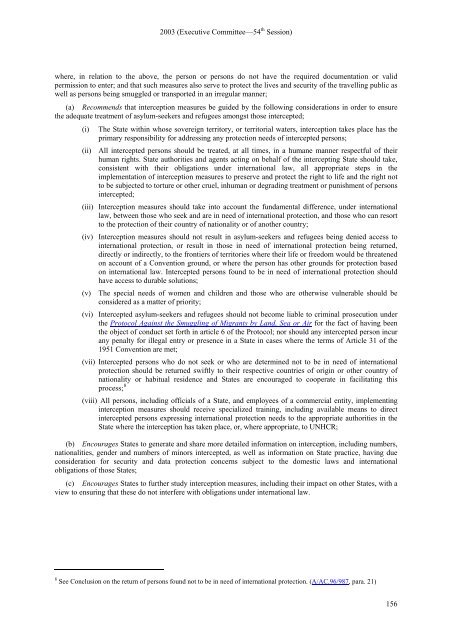CONCLUSIONS ADOPTED BY THE EXECUTIVE ... - UNHCR
CONCLUSIONS ADOPTED BY THE EXECUTIVE ... - UNHCR
CONCLUSIONS ADOPTED BY THE EXECUTIVE ... - UNHCR
You also want an ePaper? Increase the reach of your titles
YUMPU automatically turns print PDFs into web optimized ePapers that Google loves.
2003 (Executive Committee—54 th Session)<br />
where, in relation to the above, the person or persons do not have the required documentation or valid<br />
permission to enter; and that such measures also serve to protect the lives and security of the travelling public as<br />
well as persons being smuggled or transported in an irregular manner;<br />
(a) Recommends that interception measures be guided by the following considerations in order to ensure<br />
the adequate treatment of asylum-seekers and refugees amongst those intercepted;<br />
(i) The State within whose sovereign territory, or territorial waters, interception takes place has the<br />
primary responsibility for addressing any protection needs of intercepted persons;<br />
(ii) All intercepted persons should be treated, at all times, in a humane manner respectful of their<br />
human rights. State authorities and agents acting on behalf of the intercepting State should take,<br />
consistent with their obligations under international law, all appropriate steps in the<br />
implementation of interception measures to preserve and protect the right to life and the right not<br />
to be subjected to torture or other cruel, inhuman or degrading treatment or punishment of persons<br />
intercepted;<br />
(iii) Interception measures should take into account the fundamental difference, under international<br />
law, between those who seek and are in need of international protection, and those who can resort<br />
to the protection of their country of nationality or of another country;<br />
(iv) Interception measures should not result in asylum-seekers and refugees being denied access to<br />
international protection, or result in those in need of international protection being returned,<br />
directly or indirectly, to the frontiers of territories where their life or freedom would be threatened<br />
on account of a Convention ground, or where the person has other grounds for protection based<br />
on international law. Intercepted persons found to be in need of international protection should<br />
have access to durable solutions;<br />
(v) The special needs of women and children and those who are otherwise vulnerable should be<br />
considered as a matter of priority;<br />
(vi) Intercepted asylum-seekers and refugees should not become liable to criminal prosecution under<br />
the Protocol Against the Smuggling of Migrants by Land, Sea or Air for the fact of having been<br />
the object of conduct set forth in article 6 of the Protocol; nor should any intercepted person incur<br />
any penalty for illegal entry or presence in a State in cases where the terms of Article 31 of the<br />
1951 Convention are met;<br />
(vii) Intercepted persons who do not seek or who are determined not to be in need of international<br />
protection should be returned swiftly to their respective countries of origin or other country of<br />
nationality or habitual residence and States are encouraged to cooperate in facilitating this<br />
process; 8<br />
(viii) All persons, including officials of a State, and employees of a commercial entity, implementing<br />
interception measures should receive specialized training, including available means to direct<br />
intercepted persons expressing international protection needs to the appropriate authorities in the<br />
State where the interception has taken place, or, where appropriate, to <strong>UNHCR</strong>;<br />
(b) Encourages States to generate and share more detailed information on interception, including numbers,<br />
nationalities, gender and numbers of minors intercepted, as well as information on State practice, having due<br />
consideration for security and data protection concerns subject to the domestic laws and international<br />
obligations of those States;<br />
(c) Encourages States to further study interception measures, including their impact on other States, with a<br />
view to ensuring that these do not interfere with obligations under international law.<br />
8 See Conclusion on the return of persons found not to be in need of international protection. (A/AC.96/987, para. 21)<br />
156
















